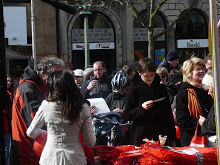
This past weekend was the Verzio Festival in Budapest, an extensive line-up of international human rights-related films.
www.verzio.ceu.hu
"Blockade," by Sergei Loznitsa, assembled in 2005, is a collection of footage shot during the siege of Leningrad during WWII. The footage had been deemed "inappropriate for propaganda purposes" and shut in the national archives. Silent, black and white, and "non-sensationalist" in showing the population in its gradual starvation.
The spirit is never so dark in this film. The Russian people in their thick, stiff boots (the uniform style of Soviet society) pushing sleighs with everything from their belongings and rubble to the dead wrapped in coarse cloth. The dead were simply left out in the street, to be picked up by an official brigade. We following them into a graveyard where corpses are given last rites and laid carefully in a mass grave.
The Leningrad women are clearly rubble, along with their children, as we see in other footage from post-war Germany. This is evidently "women's work" of the war.
The tensest moment of the film, for me, was the escorting of German prisoners through the streets. Only about 20 prisoners, who are denied any military prestige or recognition as soldiers by having their identifying medals and Nazi regalia stripped from their clothing. You see them as young, fresh from battle, only 2 or 3 are limping. One has what looks like a frozen or rotting arm in a sling.
The first citizens shown eyeing them are young women. They appear fascinated or at least curious, following the group tentatively with their eyes, then with their feet. The crowd swells--the scenes eerily quiet--as men and older women join. The Russian soldiers guard these enemies with stern resolve as an old women shakes with passionate rage, spitting at the prisoners. I become so tense--trying to realize these are Nazi offenders, who began such a war, starting the slaughter of millions. But, I mostly think about their fate. How powerless they are in small numbers, without weapons and military honors, surrounded by those who have every reason to loath them, wish harm for them. (Another example of me feeling sympathy for perpetrators of crimes---but it's the history that somehow clouds my judgment...the layers of wrongs done by all sides. Whoever has the power is often the last to be sympathized with.)
At the end, there are wooden structures built like the tent-like armature of a swingset like I used to swing on as a child. It is a very long and bulky structure from which, I realize, corpses will soon hang. The wide yard fills to capacity from shot to shot.
Large trucks with flatbeds are parked underneath, makeshift platforms for the German prisoners and Russian their executioners. Then, the trucks drive away at once with mechanical efficiency, leaving (very matter-of-factly) the prisoners hanging. I wonder what kind of fate had been endured by these men since I had last observed them.




No comments:
Post a Comment